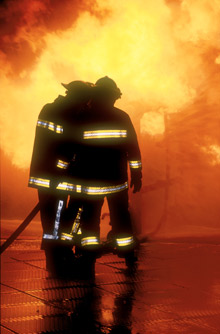It seems beyond belief in a so-called "civilised society" that anyone would want to attack firefighters who are placing their lives at risk to ensure the safety of others. Sadly, time and again when responding to emergency calls, crews are threatened with physical assault, assailed by bricks, bottles and golf balls, and even have to contend with youths recording their anarchic exploits on mobile phones.
The seriousness of the situation was underlined last summer in Lincolnshire, England, when a fire engine, responding to an emergency call, had a slab of concrete dropped on it from a bridge, thankfully the crew escaped injury but it could have been so much worse. It is only a matter of time before a firefighter is seriously injured in the line of duty as the ferocity of attacks escalates with incidents involving fireworks, petrol bombs and air rifle wielding thugs, now commonplace.
Recent events in Ballymena, Northern Ireland, have also brought into sharp focus the orchestrated nature of attacks and a blatant disregard for the well being of firefighters and members of the general public. Premeditation was certainly evident earlier this month when, for four nights running, local fire crews faced a barrage of missiles as fires were started in derelict flats, with the culprits waiting in alleyways nearby for fire engines to arrive before launching their assault.
 Across the UK such attacks do not just impact on the fire service, and their ability to respond to real incidents, they are also putting a tremendous strain on other emergency services. The police, for example, are now having to escort fire engines into certain trouble hot spots.
Across the UK such attacks do not just impact on the fire service, and their ability to respond to real incidents, they are also putting a tremendous strain on other emergency services. The police, for example, are now having to escort fire engines into certain trouble hot spots.
So what can be done to address this major problem?
The UK Government for its part has brought in new legislation, the Emergency Workers (Obstruction) Act 2006, which came into force in February. This follows on from a scheme in Scotland and offenders now face fines of up to £5,000 for impeding emergency service workers such as firefighters in the course of their duties.
In terms of security technology, for the last few years compact vehicle mounted CCTV recording systems have been rolled out in fire engines to help gather valuable evidence while en route to incidents and to monitor the perimeter around an appliance when it is at the scene of a fire.
These digital CCTV recording systems are typically integrated with a forward-facing PTZ colour camera which looks through the windscreen with, if necessary, additional cameras installed around the fire engine for all round monitoring and recording. A perimeter protection capability can help to alert a crew to the presence of a potential threat to their safety - attackers will often try to sneak-up on firefighters - when they are concentrating on the task in hand.
Control of the PTZ camera from within the cab means that highly detailed images of offenders can be captured and played back in the vehicle or downloaded for subsequent review. Such video evidence has been invaluable in gathering evidence on offenders and has led to a number of arrests and should prove beneficial in securing convictions under the new legislation.
When it comes to tackling this problem in the long term, the answer has to be through a range of measures including community work so offenders recognise the valuable role that the fire service plays by participating in cadet schemes and other initiatives, having CCTV technology in place so there is the right evidence available to prosecute offenders and making sure that the punishment which they receive is a sufficient deterrent to make re-offending the exception rather than the rule.



















